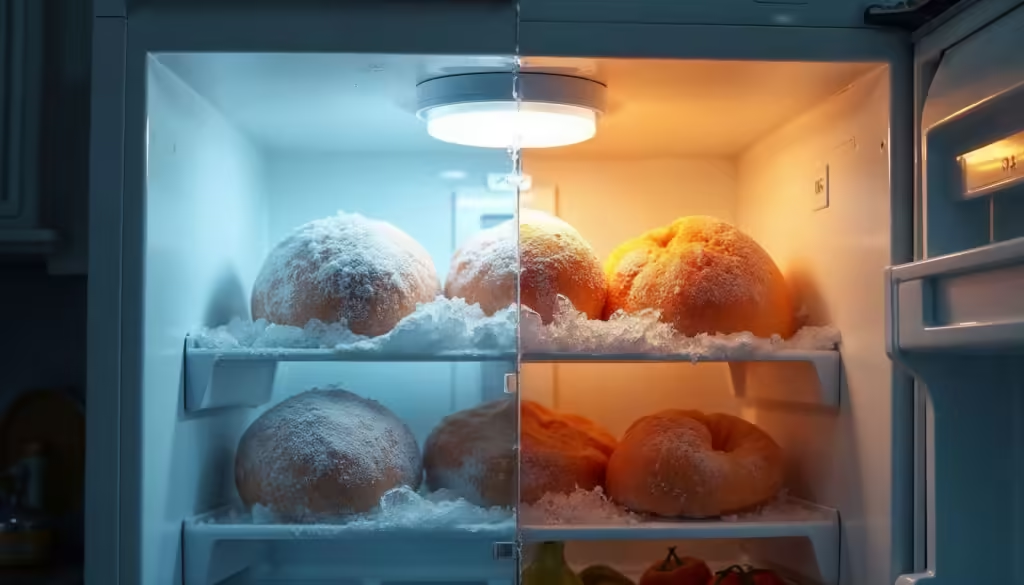Is your refrigerator warm but the freezer remains cold? This is a common issue that can be both confusing and frustrating. Understanding the underlying causes can help you troubleshoot the problem effectively. In this guide, we’ll explore potential reasons and solutions to get your refrigerator back to optimal performance.
Common Causes and Solutions
1. Overloaded Freezer Blocking Airflow
Cause: An overpacked freezer can obstruct the vents that allow cold air to circulate into the refrigerator compartment. When these vents are blocked, the fridge doesn’t receive enough cold air to maintain its temperature.
Solution:
- Organize Your Freezer: Ensure that food items are not blocking the vents located typically at the back or sides of the freezer.
- Avoid Overpacking: Leave space between items for proper air circulation.
- Regularly Declutter: Remove old or unnecessary items to maintain adequate space.
2. Faulty Evaporator Fan Motor
Cause: The evaporator fan motor circulates cold air from the freezer to the refrigerator. If it’s malfunctioning, the freezer may stay cold, but the fridge will not receive the chilled air it needs.
Solution:
- Listen for Fan Operation: Open the freezer door and listen for the fan running. If it’s silent or making unusual noises, it may be defective.
- Check for Obstructions: Ensure the fan blades can spin freely without any blockage.
- Test the Motor: Use a multimeter to check for continuity. If the motor is faulty, it will need to be replaced.
- Consider Professional Help: If you’re not comfortable testing the motor, contact an appliance repair technician.
3. Frosted Evaporator Coils (Need for Defrosting)
Cause: Frost buildup on the evaporator coils can prevent cold air from passing through to the refrigerator compartment. This is often due to a malfunction in the defrost system.
Solution:
- Manual Defrost: Unplug the refrigerator and allow it to defrost for several hours. Remove any visible frost buildup.
- Check Defrost Components: Inspect the defrost heater, thermostat, and timer for functionality.
- Regular Maintenance: Defrost your freezer regularly if it’s not a frost-free model.
- Professional Assessment: If frost continues to accumulate, seek professional assistance to check the defrost system.
4. Dirty Condenser Coils
Cause: Condenser coils dissipate heat from the refrigerator. If they’re covered in dust and debris, they can’t efficiently release heat, causing the refrigerator to warm up.
Solution:
- Unplug the Refrigerator: Always disconnect power before maintenance.
- Locate the Coils: Found either at the back or beneath the fridge.
- Clean the Coils: Use a coil cleaning brush or vacuum to remove dust and debris.
- Regular Cleaning Schedule: Clean the coils every six months to maintain efficiency.
5. Malfunctioning Defrost System
Cause: The defrost system (including the defrost timer, heater, and thermostat) prevents frost buildup. If any component fails, frost can accumulate on the evaporator coils.
Solution:
- Inspect Defrost Timer: Manually advance it to initiate a defrost cycle. If it doesn’t activate, it may be faulty.
- Test Defrost Heater and Thermostat: Use a multimeter to check for continuity.
- Replace Faulty Parts: If any component is defective, replace it to restore proper defrosting.
- Professional Repair: Consider hiring a technician for accurate diagnosis and repair.
Preventative Measures
Optimize Airflow in the Freezer
- Proper Item Placement: Keep items away from vents.
- Avoid Overstocking: Don’t fill the freezer beyond its capacity.
- Regularly Check Vents: Ensure they’re not iced over or blocked.
Maintain the Evaporator Fan
- Regular Inspection: Check the fan blades for dust or debris.
- Listen for Unusual Sounds: Noises may indicate a failing motor.
- Clean Surrounding Areas: Keep the fan area free from obstruction.
Keep the Defrost System Functional
- Monitor Frost Levels: Excess frost is a sign of defrost issues.
- Regular Defrost Cycles: If manual, adhere to a defrost schedule.
- Check Door Seals: Damaged gaskets can introduce moisture leading to frost.
When to Call a Professional Appliance Repair Service
If you’ve tried the above solutions and your refrigerator is still warm, it may be time to consult a professional. Expert technicians have the tools and experience to diagnose and fix complex issues.
Professional Repair Services Include:
- Compressor Evaluation: Assessing if the compressor is functioning correctly.
- Refrigerant Leak Detection: Identifying and repairing any leaks.
- Electrical Component Inspection: Ensuring all electrical parts are operational.
- Comprehensive Diagnostic: Providing a full assessment to pinpoint the exact cause.
Conclusion
Addressing a situation where the freezer is cold but the refrigerator is warm involves checking for simple issues like blocked vents or dirty coils and may extend to more complex problems requiring professional help. Regular maintenance is key to preventing such issues and prolonging the life of your appliance. If troubleshooting doesn’t resolve the problem, don’t hesitate to reach out to a qualified appliance repair service to ensure your refrigerator operates efficiently.
Frequently Asked Questions (FAQ)
Q: Can overpacking the freezer affect the refrigerator’s temperature?
A: Yes, overpacking can block airflow vents, preventing cold air from reaching the refrigerator compartment, causing it to warm up.
Q: How often should I clean the condenser coils?
A: It’s recommended to clean them at least twice a year to ensure efficient operation.
Q: What signs indicate a faulty evaporator fan motor?
A: Common signs include unusual noises, the freezer being cold while the fridge is warm, or the fan not running when the freezer door switch is activated.
Q: Is frost buildup normal in a freezer?
A: A small amount of frost is normal, but excessive frost indicates a problem with the defrost system.
Q: Should I attempt to repair the defrost system myself?
A: Unless you’re experienced with appliance repairs, it’s safer to have a professional diagnose and fix defrost system issues.
